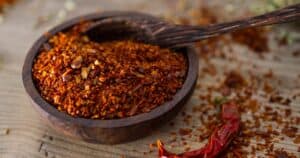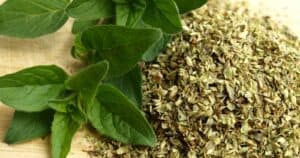Finding out your dog gobbled up some spicy people food can be really scary. But don’t freak out! Taking quick action can help your dog feel better fast.
If your dog eats anything spicy or you think they snatched some spiced-up food, follow these crucial steps right away:
- Check for mouth irritation. See if they’re drooling, licking their lips a lot, or pawing at their mouth.
- Take away any leftover food. Your dog could eat more and get even sicker. Toss it immediately!
- Give them water to drink. Help flush out the burning spices. Add some broth to tempt them.
- Call the vet. Ask if you should make your dog vomit up the food. The sooner it’s out of the tummy, the better!
- Watch for vomiting or diarrhea. These usually start 6-12 hours after spicy food.
- Don’t feed your dog for 12-24 hours. This gives their upset tummy time to feel better.
- Slowly restart bland meals when symptoms stop. Try boiled chicken and rice at first.
Catching spicy food ingestion fast and taking instant action gives your dog the best chance of avoiding serious illness. This article explains why spicy foods are dangerous for dogs and how to provide the best at-home treatment. Arm yourself with the right knowledge so you can act quickly if your dog ever eats anything spicy!
Why Spicy Foods Are Problematic for Dogs
Dogs don’t possess the same physiology as humans when it comes to enjoying spicy cuisine. Their mouths and digestive systems lack protections against irritants found in spices like chili peppers.
When dogs ingest spicy foods, the burning and inflammation can cause lots of unpleasant symptoms and potential health complications.
Oral and Stomach Irritation
Spicy compounds like capsaicin immediately activate pain receptors. You may notice lip smacking, drooling, or head shaking right after eating.
These spices also inflame the delicate lining of the gastrointestinal tract. Vomiting and diarrhea often start 6-12 hours after exposure.
Digestive Upset
Spicy seasonings aggravate the digestive system, leading to nausea, cramping, gas, constipation, and bloody stool. The irritation can damage gut tissues over time.
Dehydration
All that vomiting and diarrhea results in fluid loss and electrolyte imbalances. Left untreated, dehydration can become life endangering.
Kidney and Pancreas Damage
The kidneys work overtime to flush out capsaicin. Prolonged heavy exposure may lead to toxin buildup, kidney disease, and pancreatitis.
So it’s absolutely best to keep all spicy foods far away from your dog’s curious snout and paws. The misery and health risks simply aren’t worth it!
Signs Your Dog May Have Eaten Something Spicy
Our dogs can’t tell us when they feel sick, so recognizing symptoms of spicy food ingestion is crucial. Call your vet ASAP if you notice:
- Lip smacking, drooling, or excessive swallowing
- Head shaking and mouth pawing
- Loss of appetite or refusal to eat
- Nausea, vomiting, or diarrhea
- Bloody or black stool
- Signs of dehydration
- Increased thirst and urination
- Lethargy or depression
- Hiding or restlessness
- Whining, panting, or pacing
Symptoms often start 6-12 hours after exposure but may show up sooner if a large quantity was consumed. Severity depends on the
What To Do If Your Dog Eats Spicy Food
If your dog gets into something spicy or you suspect it happened, quick response is vital. Follow these steps:
Step 1: Check for Oral Irritation
Look for immediate mouth discomfort like pawing at the lips and tongue. Watch for drooling and head shaking too.
Your dog may frantically lick its body if skin irritation occurs. Check for red, inflamed areas, especially around the mouth and belly.
Step 2: Take Away Spicy Food
If your dog ate human food with spices, immediately remove it so they can’t eat more. Discard it in a secure trash can.
Step 3: Offer Plenty of Water
Encourage your dog to drink water to dilute irritants. Add low-sodium broth or milk for encouragement. Use a pet fountain for interest.
Step 4: Contact Your Vet
Phone your vet, especially if signs concern you. They may advise inducing vomiting if recently eaten. Quick removal minimizes GI damage.
Severe cases may need an in-person vet visit for examination, blood work, and treatment. Share details on the type and amount ingested.
Step 5: Monitor Behavior and Symptoms
Watch for concerning symptoms like vomiting, diarrhea, depression, or signs of pain over the next 6-12 hours. Note any abnormalities and share with your vet during follow up.
Step 6: Withhold Food
Avoid giving food for 12-24 hours to allow the stomach to rest. Slowly reintroduce bland foods like boiled chicken and rice once symptoms resolve.
At-Home Treatment for Mild Ingestion
For mild exposure where only a small amount was consumed, try these tips to ease discomfort. But if symptoms persist or seem severe, your vet may need to provide injectable anti-nausea medication, IV fluids, or hospitalization.
- Encourage hydration – Provide fresh water always. Add low-sodium broth for encouragement. Use ice chips to soothe mouth.
- Offer a bland diet – Once vomiting stops, give boiled chicken and rice for a few days. Slowly transition back to normal dog food.
- Give probiotics – Plain yogurt helps restore good gut bacteria after diarrhea or vomiting.
- Try digestive enzymes – Supplements like papain may help break down irritating capsaicin. Ask your vet about proper dosage.
- Watch for dehydration – Note lethargy, loss of skin elasticity, sticky gums, and other red flags. Call the vet if you have any concerns.
- Avoid human anti-inflammatories – Never give your dog human NSAID pain meds without veterinary direction.
Preventing Your Dog From Eating Spicy Foods
An ounce of prevention is absolutely worth a pound of cure when it comes to dogs and spicy foods. Here are some tips to avoid this nightmare scenario:
- Store human food out of reach, like in pet-proof cabinets. Never leave food unattended.
- Avoid cooking with spices if your dog has access to the kitchen. Opt for blander recipes.
- Clean up food spills immediately before your dog can access them. Use pet-safe cleaners.
- Feed your dog before spicy meal prep. Full tummies make them less likely to steal food.
- Keep trash cans tightly closed. Dogs can smell tempting leftovers.
While the occasional tiny taste likely won’t seriously harm your dog, it’s simply safest not to chance exposure to spicy foods at all. A little planning goes a long way!
Alternative Human Foods Dogs Can Eat
While spicy foods are off limits, some mild human foods can be occasional treats for dogs. In moderation, try:
Proteins:
- Plain boiled chicken or turkey
- Scrambled or hard-boiled eggs
- Unsalted deli meat
- Canned fish like tuna or salmon
Dairy:
- Plain yogurt
- Small amounts of mild cheese
Fruits:
- Slices of apple, banana, or watermelon
- Fresh or frozen blueberries
- Mashed strawberries
Veggies:
- Steamed green beans, carrots, or broccoli
- Cucumber slices
- Baked potato without seasoning
Never feed onions, garlic, grapes, raisins, bones, or chocolate. And always transition new foods slowly while monitoring for allergic reactions.
Keeping Your Dog Happy and Healthy
In addition to avoiding spicy foods, here are some tips for keeping your furry best friend healthy:
- Annual vet visits – Wellness checks detect issues early. Keep vaccines and preventatives current.
- High-quality diet – Choose a dog food tailored to your dog’s age, size, and activity level.
- Exercise – Provide plenty of walks, play time, and access to a secure yard for activity.
- Toys and enrichment – Rotate new toys to prevent boredom. Use food puzzles for mental stimulation.
- Grooming – Brush frequently to reduce shedding and skin problems. Trim nails as needed.
- Training – Use positive reinforcement to teach good manners and important cues.
- Love! – Your dog’s health and happiness depends on plentiful attention, affection, and quality time with you!
When to Rush Your Dog to the Vet After Eating Spicy Food
Mild cases can often be managed at home with supportive care. But if symptoms become severe or concern you, emergency vet treatment may become necessary. Seek immediate care if your dog experiences:
- Repeated vomiting or diarrhea lasting over 6-12 hours
- Signs of abdominal pain like whining or stretching
- Extreme lethargy, weakness, or depression
- Little to no interest in food for over a day
- Weight loss exceeding 5% of body weight
- Dry gums, sunken eyes, loss of skin elasticity, or other signs of dehydration
- Hiding, restlessness, agitation, or other abnormal behaviors
- Dark tarry stool or bloody vomit
- Difficulty breathing
- Seizures or unexplained tremors
Serious cases may require hospitalization, IV fluids, anti-nausea medication, and other intensive veterinary treatment. Don’t hesitate to visit the emergency vet if your dog seems ill after eating spicy food. Timely treatment can help prevent lasting damage.
FAQs: Dogs and Spicy Foods
Still have questions about dogs and spicy foods? Here are answers to some common queries:
What happens if a dog eats spicy food?
Spicy foods often cause vomiting, diarrhea, dehydration, and mouth discomfort in dogs. Severe cases may lead to kidney damage, pancreatitis, and other serious effects.
Can dogs die from eating spicy food?
It’s very rare for a dog to die from eating spicy food alone. But spicy foods can potentially trigger severe dehydration, pancreatitis, and other life-threatening conditions requiring emergency vet care.
Will my dog be OK if he eats a little bit of spicy food?
A tiny taste likely won’t seriously harm your dog. But reactions vary, so it’s best to completely avoid exposure to prevent adverse effects. Never intentionally feed spicy food.
How much spicy food can a dog eat without getting sick?
Dogs have varying
What human pain reliever can I give my dog for spicy food discomfort?
Never give your dog human medications like NSAIDs without consulting your vet first. Many human pain relievers are toxic to dogs. Let your vet recommend a safe dog-approved option.
The Takeaway: Prevention Is Key!
While scary, dogs eating spicy people food can often be treated with prompt supportive care guided by your vet. But prevention is always best to avoid discomfort, misery, and risks. Keep all temptingly spiced dishes far from your dog’s reach!
Focus on providing a species-appropriate diet, plenty of exercise and enrichment, routine vet checkups, and lots of love. Your devoted dog depends on you to keep them happy and healthy!





